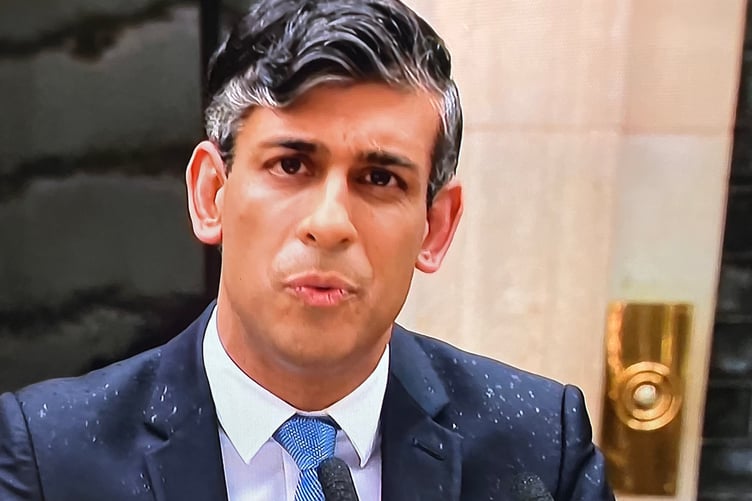A FEW months ago, I appealed to the Voice readership to dig deep in their empathy reserves and leave Rishi Sunak alone.
You might recall that he’d been photographed eating a pasty “the wrong way”, and the furore on social media led one to think that had he bumped into any of his critics in person, he would have been hung, drawn and quartered for such a heinous crime.
I implored anyone who would listen: “Just let the poor beggar eat his lunch in peace.”
But I revised my opinion last week as the beleaguered PM stood at the lectern outside that most famous of black doors to announce the date of the next election.
The heavens opened. As the world’s media papped him, every camera flash bounced off his soaking wet suit, and even the most politically obtuse could have predicted the next day’s front pages.
Images of a man looking miserably sodden were matched by headlines deploying the kind of cheesy puns the UK press are so good at: “Drowning Street.” “Things can only get wetter.” “Drown and out.”
Whose idea was it to deliver such important news in the middle of a torrential downpour? Did no ministerial aide suggest: “Hang on there, it can wait 10 minutes”?
Were there no umbrellas to hand? This is London, for goodness’ sake – everyone carries a long black brolly and wears a bowler hat (source: Mary Poppins, and she never lies).
To his credit, Rishi laughed it off philosophically the next day. But for someone keen to make a good impression, it was hardly the best start, on a par with then-Labour leader Neil Kinnock falling over on Brighton beach.
Such a dramatic event was perhaps an appropriate starting gun for the kind of news coverage that ensued. “Wall-to-wall” barely covers it, unless you’re talking on the scale of the Great Wall of China.
Potential voters up and down the country were asked their opinion. Professor Sir John Curtice, a fine man of St Austell stock, was wheeled out to quote statistics on how it’s all likely to pan out.
The Other Half rolled his eyes from the sofa. “The election will be on Thursday, July 4. The End. That’s all we need to know,” he harrumphed.
The local news bulletin teaser: “Election reaction from where you are.” OH’s eyes popped: “IT’LL BE EXACTLY THE SAME!” he exclaimed, eyebrows on the ceiling.
On Thursday, Daughter came home from debate club. Today’s topic: should all citizens be obliged to vote, as they are in Australia? We had been discussing it that very morning, having heard more than one interviewee declare: “I won’t bother. They’re all the same. Blah blah blah.”
I grew up in a family with strong political views. My grandfather was a staunch trade union man, and believed that “them that don’t vote don’t have a voice”. I’m inclined to agree. Emily Wilding Davison didn’t die under that horse so I could sit on my backside on polling day, let other people choose my prime minister, then moan about how rubbish they are.
Of course, a general election is the one event most people do turn out for, because the change is so clear for all to see. It’s driven by personality as much as by policies, and comes with the added excitement of the counts and the nail-biting declarations (I’m specifically recalling the deposition of Michael Portillo here).
I cast my mind back to the most significant elections of my time. 1979: how wonderful it was, six-year-old me opined, to have a female prime minister (Grandad begged to differ, largely on account of the woman in question).
1992: the one where we all thought the Conservatives would be toppled by Kinnock, only for John Major to pull it back. In France on a year out as an au pair, I was aghast when my right-leaning employer broke the news with a smug grin.
Then there was 1997. Regardless of which way you vote, there can be no mistaking the sheer thrill of a sea change in politics. I was on a journalism training course, learning the nuts and bolts of local government. Few of us students could remember a government that wasn’t Conservative, at least not in a meaningful way.
Aged just shy of 14, Daughter has seen an alarming number of leaders in her short life, not all of them the result of a general election. She can barely name them all, but “they are all Tories.” I wonder whether her school will be prepared to let the kids stay up late and experience this momentous occasion.
The question is, will 2024 be a repeat of 1997 or 1992? Will Starmer be a Blair or a Kinnock? One thing is for sure: it will be a long, memorable night.





Comments
This article has no comments yet. Be the first to leave a comment.